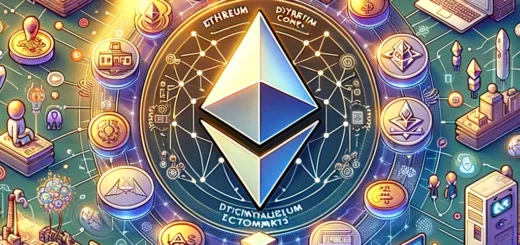How Does Ethereum Work?
Whether you’re trading it, buying it, or mining it, Ethereum (ETH) is bound to intrigue you, and you might wonder: how does it actually work? To begin with, you need to know that Ether, the cryptocurrency, is inextricably linked to Ethereum, the platform that created it.
Understanding Ethereum
Imagine a super “computer” made up of a network of computers that enable it to function daily. This network uses blockchain technology, similar to Bitcoin, but with the distinction that the Ethereum blockchain is not solely dedicated to managing payments. One of its primary goals is to create decentralized applications called smart contracts, which are not controlled by third parties and are resistant to censorship and fraud.
The Role of Ether
The cryptocurrency Ether serves as a means of payment for the computational resources required by network users to run applications on the Ethereum network. Developers also use it to build their applications and smart contracts. But how does Ethereum work in practical scenarios, for instance, when buying goods and services? The answer is simple: it works as long as merchants accept it as a form of payment.
Using Ether
So, how can you use Ether? Like any other crypto, you can mine it, store it in your wallet, or trade it on exchanges to make a profit. If you’re not using it to create or run applications on the Ethereum network or to buy goods, the best thing to do is try to buy and sell it on marketplaces, capitalizing on the fluctuations in the ETH price.
Practical Applications of Ethereum
- Mining: Mining involves using computational power to solve complex algorithms, validating transactions on the network, and earning Ether as a reward.
- Storing: You can store your Ether in digital wallets, which come in various forms such as hardware wallets, mobile wallets, and desktop wallets, each offering different levels of security.
- Trading: Trading Ether on exchanges like Coinbase, Binance, and Kraken allows you to take advantage of price volatility to earn profits.
- Developing dApps: Developers use the Ethereum platform to create decentralized applications (dApps) that can perform various functions without the need for intermediaries.
- Smart Contracts: Smart contracts are self-executing contracts with the terms of the agreement directly written into code. They automatically execute transactions when predefined conditions are met, reducing the need for trusted intermediaries.
Conclusion
Ethereum’s versatility as a platform for decentralized applications and its robust cryptocurrency, Ether, make it a significant player in the world of blockchain technology. Whether you’re using it for transactions, development, or investment, understanding how Ethereum works will help you make the most of its capabilities.



